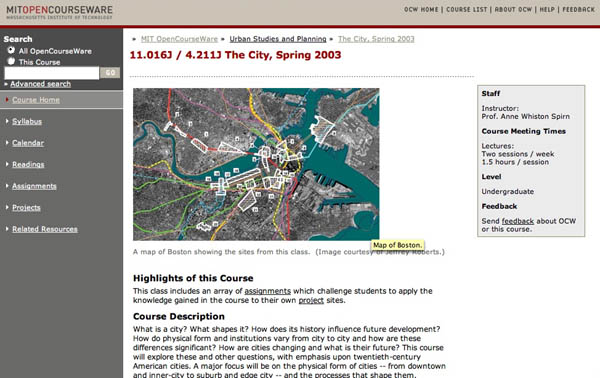Jimmy Wales of Wikipedia dreams of a free curriculum – open, high quality course materials built by a grassroots movement of volunteers (much like the one that is building the web’s largest encyclopedia). But Wales is not alone in his dreaming. The Massachusetts Institute of Technology also wants to spread the wealth – but not through a groundswell.
OpenCourseWare is all about the heights. OCW publishes syllabi, course calendars, readings, exams and other study materials from over 1,100 MIT classes – “a free and open educational resource for faculty, students, and self-learners around the world.” Sounds good. And it is pretty good, but it’s important to know one crucial fact: at this stage, many, if not most, course readings are only listed for reference. Anything in the public domain is available for download (or is linked to a free resource like Project Gutenberg), but most of the courseware is not, in effect, open.

OpenCourseWare is most powerful as an idea, the same idea trumpeted by Wales, though they are pushing from opposite sides. MIT dispenses manna from the ivory tower while Wiki Books rallies instructors from middle and lower-tier American universites and developing countries. Both movements are in their infancy – largely untested.
There is some evidence that the OCW model is beginning to spread. Tufts University has launched its own OpenCourseWare project, as has The Johns Hopkins Bloomberg School of Public Health, and several universities in Japan (see OCW Japan portal). But to say that MIT has more institutional heft than the Wikimedia Foundation would be a serious understatement. It’s relatively easy for them to launch a project like this, with the MIT stamp, and to quickly generate a favorable buzz. But in the end, how valuable will OCW be if you can’t get your hands on the bulk of the materials? As more content becomes freely available through public-spirited ventures like Wiki Books and Creative Commons, as well as a myriad of independent online textbooks, OCW might need to populate its courses with such materials in order to stay relevant and useful.
But will an elite institution like MIT be willing in the end to incorporate texts and materials forged in the far-flung suburbs of the academy? MIT syllabi are stocked with quality scholarship – expensive, well-bred stuff. It’s difficult to imagine Wiki Books taking a seat among such high class company. And so it’s equally difficult to tell, for an institution like MIT, whether OCW is a sign of healthy adaptation or inevitable erosion. Questions like these point to the profound changes that will rock the modern university as the web levels and obsolesces the old hierarchies – as profound as the upheavals in Europe around the dawn of moveable type.
if:book
A Project of the Institute for the Future of the Book
